Ya Hsien was the first Chinese writer to participate in the IWP residency when it started in 1967. He is one of the leading modernist Chinese-language poets, and has published several books of poems. He is a storyteller in poetry; his poems are witty, musical, and have a sense of the vicissitudes of Chinese life. In 1977, he became the literary editor of the leading newspaper in Taiwan, United Daily News. He has established awards for several literary genres and brought young literary talents to prominence. Now retired, he lives in Canada. (Photo from 1967, Iowa City)
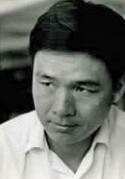
SU Tong / 苏童 (fiction writer, China; b. 1963, Suzhou) is the author of the novel Rice (Penguin Books). His novella Raise the Red Lantern was made into an internationally acclaimed film that was nominated for an Academy Award. Mr. Su graduated from Beijing Normal University with a degree in Chinese literature. He now lives in Nanjing. The University of Iowa is providing his participation in the IWP.
graduated in 1981 from the Chinese Department of Taiyuan Normal College and later studied at Beijing University. Her first published story, “Wo de liangge nuer” (My Two Daughters), marked the beginning of the Wound Literature movement in Shanxi. Since then, Ms. Jiang has published widely. Xianchang taoyi (Escape from the Scene, 1998), the third of her four story collections, was translated into French as Delit De Fuite (2001); and her five novels include Shanshuo zai nide zhitou (Shining on the Top of Your Tree, 1998) and Wo de leilu (My Interior Land, 2001). She is participating courtesy of the University of Iowa Chinese Community.
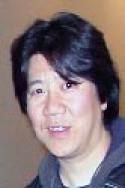
is a graduate of the Beijing School of Dramatics, and is called one of the foremost avant-garde playwrights in China. His productions in Chinese off-Broadway theaters have included The Rhinoceros in Love, Scandals from One Street, and Beckett’s Waiting for Godot, adapted for Chinese. His latest film is Chicken Poets. He is participating courtesy of the Asian Cultural Council.
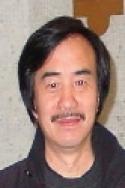
is best known for a series of stories published under the title Houtu (Thick Earth), which won the China Times Literary Prize, and gained him an international reputation. One of his country’s major writers, Mr. Li has published four novels, three essay collections, and four story collections. Many of these works have been translated into Swedish, English, French, Japanese, German, Dutch, and other languages. His most recent novel is Yingcheng gushi (Tale of Silver City, 2001); an eight-volume Dongyue Wenku: Li Rui Collection will be published by Shandong Wenyi Publishing House in 2002. He is participating through the courtesy of the University of Iowa Chinese Community.
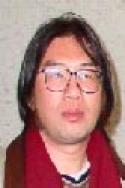
(poet; China b. 1963, Xu Zhou) is a vice-professor of western literature and English language at the Central Academy of Fine Arts. Elected in 1996 to the board of directors of the Chinese Poets’ Association, Xi Chuan (pen name of Mr. Liu Jun) has published four collections of poems, most recently Water Stains (2001), in addition to a play and translations. His poetry has been widely anthologized and translated into more than ten languages. Among his many prizes is the prestigious Lu Xun Prize for literature in 2001. He is participating courtesy of the Freeman Foundation.
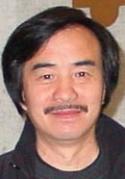
is a literary heavyweight in Chinese writing today. He has published several books of novels and short stories. He became best known for a series of stories published under the title Houtu (Thick Earth), which won the China Times Literary Prize and gained him a reputation across the Taiwan Straits. One of his novels, Tale of Silver City, consists of stories of individuals who were either pro- or anti-revolution at the end of Imperial China, and for whom their common fate was death. Many of his works have been translated into Swedish, English, French, Japanese, German, Dutch, and other languages.
(novelist; China b. 1960, Hangzhou) published his first book in 1984, Shibasui Chumen Yuanxing (Leaving Home at Eighteen) which was followed by several more novels and collections of short stories and essays, most notably, Huo Zhe (To Live), made into a film by renowned director Zhang Yimou, winning the Grand Jury Prize and Best Actor at the Cannes Film Festival in 1994. Trained as a dentist, Yu Hua left the profession after five years to become a writer. His works have been translated into numerous languages; To Live (Random House, trans. Michael Berry) appeared in English in 2003, followed by Chronicle of a Blood Merchant (Pantheon, trans. Andrew F. Jones) also in 2003. Considered avant-garde and controversial, his fictions place him in the forefront of China's literary scene. He will be participating courtesy of The University of Iowa Chinese Community.
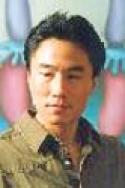
/ 严力 (painter, poet, fiction writer; China b. 1954, Beijing) was a member of a group of artists known as "The Stars," famous for their daring exhibition of works tinged with abstraction and surrealism; as a writer, he is identified with the Misty Poets, a group that gained notice in the late 70s for their subversion of social realism via personal emotions and private imagery. In 1987, he founded Yi-Hang (First Line) in New York, a quarterly journal that features the works of contemporary Chinese poets as well as translations of American poems. His work has been translated into French, Italian, English, Swedish, Korean and German. He has held many exhibitions and published numerous books, most recently a novel titled Meet with 9.11 (Literature & Art Press, Shanghai, 2002). He is participating courtesy of the Freeman Foundation.
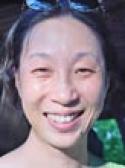
陈丹燕 (b. 1958), after studying Chinese literature at Eastern China Normal University, became editor of Children's Epoch and translator of children's literature. As an independent writer and journalist she subsequently produced documentaries for Shanghai TV, and wrote a large number of stories and novels for both young people and adults. Her debut, The Chinese Girl (1984), won the Shanghai Young Writers Prize. In 1992, A Girl (also known as Nine Lives ) won the Austrian national Youth Book Prize and the UNESCO Literature of Tolerance gold prize. The themes of her 1998 collection Shanghai Princess , which dwelt on women and the only-one-child generation, marked a new genre. Since 1997, she has been famous for her Shanghai stories, translated to Japanese, Vietnamese and English. Over 50 of her books appeared in China, Japan, Germany, Austria, Switzerland, and Taiwan. She lives in Shanghai, and participates courtesy of the Freeman Foundation.

(playwright, director; b. 1955, China) is one of the best-known playwrights in Shanghai. Over the last several years, much of Mr. Zhang's work has been produced for the screen and the stage, nationally as well as internationally. Those Left Behind won "Best Film of Golden Pyramid Award" at the 16 th Cairo International Film Festival, and Xian was awarded a fellowship from the Asian Cultural Council (ACC) to further his studies of film and drama in New York City. A prominent figure in the arts community, Zhang has worked as the designer, curator, director, and organizer for a number of major art events in Shanghai. He is participating courtesy of the Freeman Foundation.
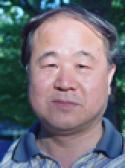
is one of China's foremost novelists, best known for his 1987 novel Hong Gaoliang Jiazu ( Red Sorghum ). The internationally acclaimed film adaptation, directed by Zhang Yimou, won the Golden Bear award at the Berlin Film Festival, becoming one of China's most popular films and bringing Chinese cinema into the international mainstream. After a childhood of extreme poverty during the Cultural Revolution, Mo worked in a factory until he joined the army in 1976. He began writing in 1981 and graduated from the Army Academy of Art and Literature in 1986, subsequently receiving a M.A. in literature from Beijing Normal University. In the late 1990s, he left the army to become a professional writer. He has written dozens of short stories and ten or more novels, translated widely. In addition to Red Sorghum , released by Viking in 1993, titles available in English include: Explosions and Other Stories (1991), The Garlic Ballads (1995), and The Republic of Wine: A Novel (2000). Mo Yan is participating courtesy of the University of Iowa; he will be attending the IWP 9/3–9/18.

(fiction writer, screenwriter, playwright, filmmaker; b. 1955, China) is a prize-winning, widely anthologized writer, with many TV and film credits. She has produced and directed in both media, venturing next to independent filmmaking. She has published over a dozen novellas, four collections of stories, two novels, and is currently at work on Another China , a documentary film project about expatriate Chinese writers in New York, and a new novel. Tang's numerous publications include Tell Laola I Love Her , a novella selected for inclusion in the Best Chinese Novellas of 2001 , W ife from America (1994) , a novel that was adapted for the stage, serialized in Liberation Daily , and won first prize for Stories Serialized in Newspapers and Magazines, Asexual Partners (2001), a novella that was also serialized, No Love in Shanghai (2002), and most recently, Senseless Journey (2003), a novella published in the Chinese journal Harvest. Ms. Tang is participating courtesy of the Asian Cultural Council.
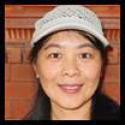
. A graduate of the Lu Xun Academy in Beijing, Ms. Chi has published over 30 books. Her work presents the time-honored practices of her northern village of Mona from a feminist perspective. At the same time, in novels such as [Silver Plates], [The River Rolls By] and [Beloved Potatoes], she weaves fragments of the old and new to show a rapidly changing country. Little of her writing has been translated into English, beyond a short story collection, Figments of the Supernatural, which won the 2004 Suspense-Sentence Fellowship from the James Joyce Foundation in Australia. She is participating courtesy of the Freeman Foundation.

. Mr. Liu ’s work exposes society’s bleak side in the fashion of the great writers of the realist tradition. His works are mostly novella-length, the best known of which, Fuxi Fuxi (1987) was adapted into the motion picture Ju Dou. Three novellas were published in English in the volume The Obsessed (Beijing, 1991). His novel, Hei de xue was translated into English as Black Snow (Atlantic Press,1993), and made into an eponymous feature film; Green River Daydreams was published by Grove in 2001. His latest work, adapted for television, is a long novel titled Pinzui zhang damin de xingfu shenghuo (‘The Happy Life of Chatter-box Zhang Damin’). He participates courtesy of the Freeman Foundation.
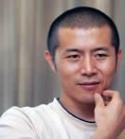
was raised in the Xinghua province of Jiangsu, China. After early years as a journalist in Nanjing, he went on to publish more than 20 novels and short story collections, several of which have been awarded prizes, including two Lu Xun prizes (1995-6; 2002-2005). In 2004, he was named Most Favorite Chinese Writer in France. Among his film work is the screenplay for Shanghai Triad (1995), directed by Zhang Yimou. His novels have been translated and published in France and Germany. He participates courtesy of The Ramon and Victoria Lim Fund, the Freeman Fund, Dr. Shiliang Sun, and Hualing Engle.
rose to fame with Suzhou River (2000) which he wrote and directed, and which won major awards at film festivals in Rotterdam, Paris and Tokyo, as well as the FIPRESCI prize in Venice, and was voted by Time Magazine (Asia) as one of the best movies of 2000. In its wake Lou Ye was banned from making films in China for two years. Since then he has written and directed Purple Butterfly (2003) and Summer Palace (2006), both screened at the Cannes Film Festival to broad critical acclaim. The working title of his current science fiction project is Restorer. He participates courtesy of the Asian Cultural Council.

is a literary heavyweight in Chinese writing today. He has published several books of novels and short stories. He became best known for a series of stories published under the title Houtu (Thick Earth), which won the China Times Literary Prize and gained him a reputation across the Taiwan Straits. One of his novels, Tale of Silver City, consists of stories of individuals who were either pro- or anti-revolution at the end of Imperial China, and for whom their common fate was death. Many of his works have been translated into Swedish, English, French, Japanese, German, Dutch, and other languages.

Ya Hsien was the first Chinese writer to participate in the IWP residency when it started in 1967. He is one of the leading modernist Chinese-language poets, and has published several books of poems. He is a storyteller in poetry; his poems are witty, musical, and have a sense of the vicissitudes of Chinese life. In 1977, he became the literary editor of the leading newspaper in Taiwan, United Daily News. He has established awards for several literary genres and brought young literary talents to prominence. Now retired, he lives in Canada. (Photo from 1967, Iowa City)

(poet; China b. 1963, Xu Zhou) is a vice-professor of western literature and English language at the Central Academy of Fine Arts. Elected in 1996 to the board of directors of the Chinese Poets’ Association, Xi Chuan (pen name of Mr. Liu Jun) has published four collections of poems, most recently Water Stains (2001), in addition to a play and translations. His poetry has been widely anthologized and translated into more than ten languages. Among his many prizes is the prestigious Lu Xun Prize for literature in 2001. He is participating courtesy of the Freeman Foundation.
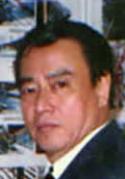
was born and educated in the Phillipines. At 17 he published his debut poetry collection, Melancholic Score. More books followed, namely Springtime in Autumn, The Rainbow Snatcher, and The Blue Dust. Na's poetry explores a range of techniques, from lyric to aesthetic and contemporary forms. In the eighties he published two more collections, Wild Plant and In the Light of Poetry and Photography. His participation is independently funded.
Hu’s most recent collection, [‘The Strength of the Calendar’] was released in 2007, as was a volume of essays, [‘The Hidden Passion in Brazil’]. He recently was named among the “Top Ten New Poets” of China; among his other awards are the Rougang Poetry Award (2003) and the Liu Li’an Poetry Award (1998). Based in Beijing, he has been published in journals and anthologies throughout the U.S., Japan, China, and Spain. Currently he is Associate Professor at the Institute of World Literature at Peking University, Beijing. He attends courtesy of the Bureau of Educational and Cultural Affairs at the US Department of State.
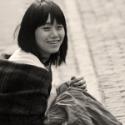
has a doctoral degree in film history and comparative cultural studies from Lumière Université Lyon 2. Her columns and articles have appeared in Historical Review,Art World, Oriental Morning Newspaper, Xin Min Du Shi, Mangazine, Travel and Leisure, Men’s Uno, among others. Jiang has also contributed translations to [‘Do’] (2007) and [‘Photographer Michael Koena’] (2005), and edited [‘Another Paris’] (2007) and [‘French Houses’] (2007). She is the editor for the Chinese magazines mg and An Jia. Bibliography Selection from work
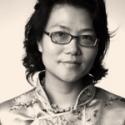
Lijia (张丽佳) is a factory-worker-turned journalist, TV producer and lecturer. Her memoir about working at a missile factory, Socialism Is Great! (2008) was published in the U.S., Australia, and India, and is being translated into a number of languages. Other publications include China Remembers, an oral history of the PRC, and Western Images of Chairman Mao, presently banned in China. Her articles have appeared in prominent Asian, European and American magazines and newspapers, and she is a frequent commentator for the BBC, CNN and NPR. She participates courtesy of the Bureau of Educational and Cultural Affairs at the US Department of State.

(格非) counts among his many works the short story collection Mizhou, and the novels Shanhe Rumeng (2007), and Renmian Taohua (2004), which won the Chinese Media Outstanding Novel award, underscoring the mark he made on the Chinese postmodernist movement. Among his scholarly publications are On Fiction Narration, The Pendulum of Kafka, and Syren’s Song. Ge Fei is professor of literature at Qinghua University. He participates courtesy of a grant from the Center for Asian and Pacific Studies at the University of Iowa.
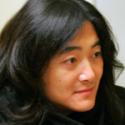
(韩博) is the author of several poetry collections including [‘BorrowDeepHeart’] and[‘A Banquet of Knots’]. In 1998 he won the Li-An Liu poetry prize for the volume [‘Transmission for Ten Years’]. His short stories have been published in a number of literary journals, including Jin Tian. A playwright as well as stage director, in 1999 he founded the Ewood Drama Studio; he directed the 2008 Mecooon Film Festival in Shanghai. Currently, Han is the editor-in-chief of MG Magazine, a travel culture magazine. He participates courtesy of the US Embassy in Beijing.
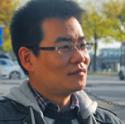
, an editor at People's Literature Magazine, is the author of three novels午夜之门 [The Gate of Midnight] (2007), 天上人间 [The Heaven and the World] (2009) and 夜火车 [The Night Train] (2009), as well as the short-story collections 鸭子是怎么飞上天的 [How Can a Duck Fly] (2006), 跑步穿过中关村 [Running through Zhongguancun] (2008), and 人间烟火 [The Earthly Life] (2009). [Hello Beijing], based on his short story, won an award for Best Television Movie. He also co-wrote the screenplay for [My Hard Boat], which won the best foreign picture award at the Action on Film International Film Festival. Zechen’s work has received numerous literary awards and is translated into German, Korean, English, and Dutch. His participation is provided courtesy of the U.S. Embassy in Beijing.
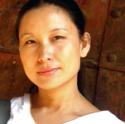
is a fiction writer and screenwriter of Korean ethnicity. For a decade an editor at the literary journal 春风 (Spring Breeze), she is now a free-lance writer. Her major works include a novel, 春香 (Spring Fragrance) and the short story collections 彼此 (Each Other), 爱情冷气流 (The Cold Front of Love), 月光啊月光 (Moonlight oh Moonlight). Jin Renshun is also the screenwriter for the films 绿茶 (Green Tea) (dir. Zhang Yuan, 2003) and 时尚先生 (Esquire Runway) (dir. Qiao Liang, 2008). Her participation is made possible by the Freeman Foundation.

ZHANG Yueran / 张悦然 (novelist, editor; China) has published the short story collections Sunflower Got Lost in 1890 (2003) and Ten Tales of Love (2004), and three novels: Cherry's Distance (2004), The Narcissus has Gone Riding a Carp (2005) and Bird Under Oath (2006), named the best saga novel on the 2006 Chinese Novel Ranking List. Since 2008 she has been the editor-in-chief of the literary magazine Newriting, which anthologizes the best of belles-lettres magazines in China. A recipient of a number of awards, among them the Most Promising Talent Prize in Chinese Press (2005), the Spring Literature Prize (2006) and the Mao-Tai Cup People's Literature Prize (2008), she is currently enrolled in the PhD program in Chinese Literature at Beijing University. Her participation is privately funded.
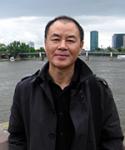
WANG Jiaxin 王家新 (poet, essayist, translator, scholar; China) is the author of five poetry collections, ten books of critical essays, and a translator of, among others, Paul Celan. Among his edited anthologies are a volume of Yeats’ works, three collections of 20th century European and American poetry, and two of contemporary Chinese poetry. His first collection of poems in English, Darkening Mirror: New and Selected Poems, is being readied for publication. Wang Jiaxin is a professor at Renmin University (Beijing) and the director of its International Writing Center. He participates courtesy of the Bureau of Educational and Cultural Affairs at the U.S. Department of State.
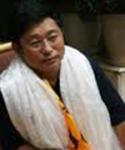
ALAI / 阿来 (fiction writer, poet; China) won the prestigious 2000 Mao Dun literary prize for his first novel, Chen ‘ai luoding, which appeared in the U.S. as Red Poppies (2003, trans. Howard Goldblatt and Sylvia Lin). His other novels include [The Silversmith Beneath the Moonlight] (2001), [Empty Mountain] (2005), [Ladder of the Earth] (2008) and, most recently, [King Gesar]. A Lai, who is of Tibetan ethnicity, has also published volumes of essays and interviews, and produced a number of scripts for television. He participates courtesy of The Paul and Hualing Engle Fund.

DAI Fan / 戴凡 (nonfiction and fiction writer, scholar; China) is a 2012-13 Fulbright Visiting Research Scholar in the Nonfiction Writing Program at University of Iowa. She writes in both Chinese and English, with four collections of essays in Chinese, and the novel Butterfly Lovers in English. Her work in English has appeared in Drunken Boat and Asia Literary Review. She is a professor of linguistics, and the director of the Center for Creative Writing of the School Foreign Languages at Sun Yat-Sen University in Guangzhou. She teaches one of the very few creative writing courses in English as a second language in China.

CHI Li / 池莉 (fiction writer; China) is regarded as the leader of the “New Realism” trend in contemporary Chinese literature. Her many novels include Zi mò hóngchén [Purple Street, Red Dust] (1995), Yī dōng wú xue [A Winter without Snow] (1995), Zhēnshí de rìzi [Days of Realness] (1995), Wuyè qi wu [Midnight Dance] (1998), Xìyāo [Skinny Waist] (1999), and Lì [Grown Up] (2013). Several titles became popular TV serials and films, among them the award-winning Life Show (2002). Her participation was made possible by The Paul and Hualing Engle Fund.
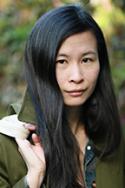
ZHOU Jianing 周嘉宁 (fiction writer, translator; China) has published seven novels and two short story collections, as well as Chinese translations of major English-language writers such as Flannery O’Connor and Joyce Carol Oates. Her most recent novel, [In the Woods], was published in 2014. Her participation is made possible by the Paul and Hualing Engle Fund.
Bi Feiyu 毕飞宇 (China, IWP '06) is one of his country's best known living writers. His debut novel [Breast-Feeding Women] was awarded the Lu Xun Literary Prize. Published in English in 2007, The Moon Opera introduced his work to the English-speaking world; his novel Three Sisters would go on to win the 2010 Man Asian Literary Prize. In 2011 his novel Massage won the Mao Dun Prize, China’s highest literary honor. A film based on the work, directed by Lou Ye, Blind Massage, won the Silver Bear prize at the 2014 Berlin Film Festival.
Jin Feng 馮進 (China/USA) is the Orville and Mary Patterson Routt Professor of Literature in the Department of Chinese and Japanese at Grinnell College. Her books include Romancing the Internet: Consuming and Producing Chinese Web Romance (2013), The Making of a Family Saga: Ginling College (1915-1952) (2009) and The New Woman in Early Twentieth-Century Chinese Fiction (2004).
Li Di An 李笛安 (China) has published six novels and several novellas. The latest part of her trilogy [Memory in the City of Dragon], Nanyin, came out in 2012; [Tale of a Chastity Memorial Arch] came out in 2014. Among her prizes are Most Promising New Talent Award and the Chinese Literature Media Award; her work has been praised for “expanding the range and depth of youth literature.”
Bi Feiyu 毕飞宇 (China, IWP '06) is one of his country's best known living writers. His debut novel [Breast-Feeding Women] was awarded the Lu Xun Literary Prize. Published in English in 2007, The Moon Opera introduced his work to the English-speaking world; his novel Three Sisters would go on to win the 2010 Man Asian Literary Prize. In 2011 his novel Massage won the Mao Dun Prize, China’s highest literary honor. A film based on the work, directed by Lou Ye, Blind Massage, won the Silver Bear prize at the 2014 Berlin Film Festival.
Jin Feng 馮進 (China/USA) is the Orville and Mary Patterson Routt Professor of Literature in the Department of Chinese and Japanese at Grinnell College. Her books include Romancing the Internet: Consuming and Producing Chinese Web Romance (2013), The Making of a Family Saga: Ginling College (1915-1952) (2009) and The New Woman in Early Twentieth-Century Chinese Fiction (2004).
Li Di An 李笛安 (China) has published six novels and several novellas. The latest part of her trilogy [Memory in the City of Dragon], Nanyin, came out in 2012; [Tale of a Chastity Memorial Arch] came out in 2014. Among her prizes are Most Promising New Talent Award and the Chinese Literature Media Award; her work has been praised for “expanding the range and depth of youth literature.”
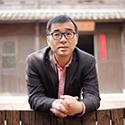
CAI Tianxin 蔡天新 (poet, essayist; China) is a professor of mathematics at Zhejiang University and the author of some 30 books of poetry, essays, and mathematics texts in China and abroad, including Every Cloud Has Its Own Name (2017) and Antologia Poetica (2014). A translator and editor of several poetry anthologies, he is the winner of the 2013 Naji Naaman Poetry Award (Beirut) and the 2017 National Award of Science and Technology (Beijing) for his book of essays [Mathematical Legends]. His participation is made possible by the Paul and Hualing Engle Fund.
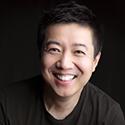
Playwright YU Nick Rongjun 喻荣军 (drama; People’s Republic of China), artistic director of the Shanghai Dramatic Arts Center, the Shanghai International Comedy Festival, and co-director of the Shanghai Performing Arts Group, has had over 60 plays produced in China and abroad. He also works in film, TV, and radio. His writing has won him the Cao Yu Script Award and an Outstanding Social Achievement Award at the Cairo International Experimental Theater Festival. His participation is courtesy of the Paul and Hualing Engle Fund.

Qi Jin Nian七堇年 (fiction writer, non-fiction writer, translator, PRC) has published a dozen titles, ranging from travel literature to speculative fiction, most recently . 无梦之境 [The Eye Phone Age] (2018). Her 2013 novel 平生欢 [The Ember of Time] won the Peoples’ Literature Award for Best Novel; her stories have appeared in China’s top literary magazines. She has also edited literary journals and translated from the English. Her participation was made possible by the U.S. Embassy in Beijing.
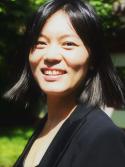
CHUN Sue 春树 (fiction writer, poet; PRC/Germany) became widely known with her iconic 2002 novel Beijing Doll, translated into many languages. She has since published five additional novels—most recently the autobiographical [Milk Teeth] (2019)—three poetry collections, and books of essays. A frequent presence at literary festivals and arts residencies in Europe, she also publishes in Chinese literary magazines. Her participation is courtesy of the Paul and Hualing Engle Fund.
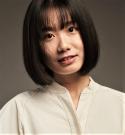
WANG Zhanhei 王占黑 (fiction writer; PRC) is the author of three story collections: [Air Cannon] (2018), which won the inaugural Blancpain-Imaginist Literary Prize, [Neighborhood Adventurers] (2018), and [Prima Donna] (2020). Her award-winning works focus on the lives of China's urban working class; some of her stories have been adapted into films and plays. She participates courtesy of the Paul and Hualing Nieh Engle Fund.
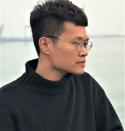
SUO ER 索耳 (fiction; editor; PRC) is the author of the novel 伐木之夜 [The Night of the Felling] and the story collection 非亲非故 [Noncorrelation]. His works have appeared in China’s top literary magazines and received many awards, the 43rd Hong Kong Youth Literary Award and a 2021 nomination as Most Promising Newcomer of the Year by the Southern Literature Festival among them. He has also engaged in publishing, media, and exhibition work. His writing concerns itself with the dispersion of cultures, and with lives of individuals in a “Southern framework.” He participates thanks to a grant from the U.S. Consulate General in Guangzhou.
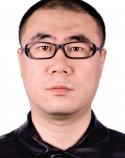
SHI Yifeng 石一枫 (novelist, editor; People's Republic of China) has authored the novels [Fruit under the Red Flag], [In Love with Beijing], and [An Unofficial History of the Heart] as well as the story collections [Chen Jinfang Is Gone] and [Itching for a Fight]. Among his many awards are the Hunan New Talent Award, the Hundred Flowers Award, the People’s Literature New Author Award, and the Yu Dafu Novella Award. He is also an editor at Dangdai magazine. His participation was made possible by the Paul and Hualing Engle Foundation.
Find Us Online